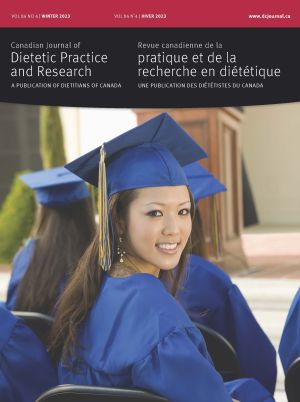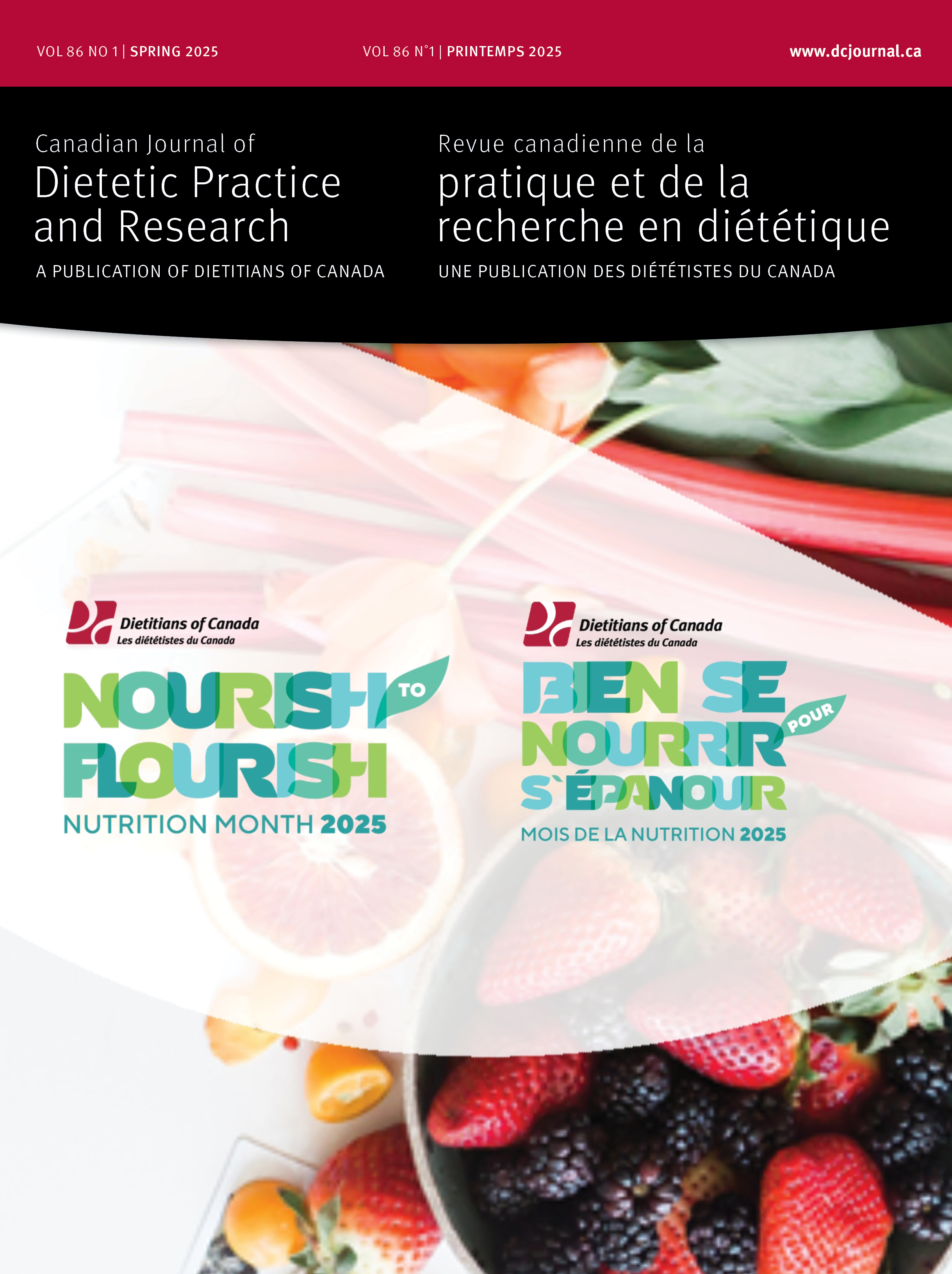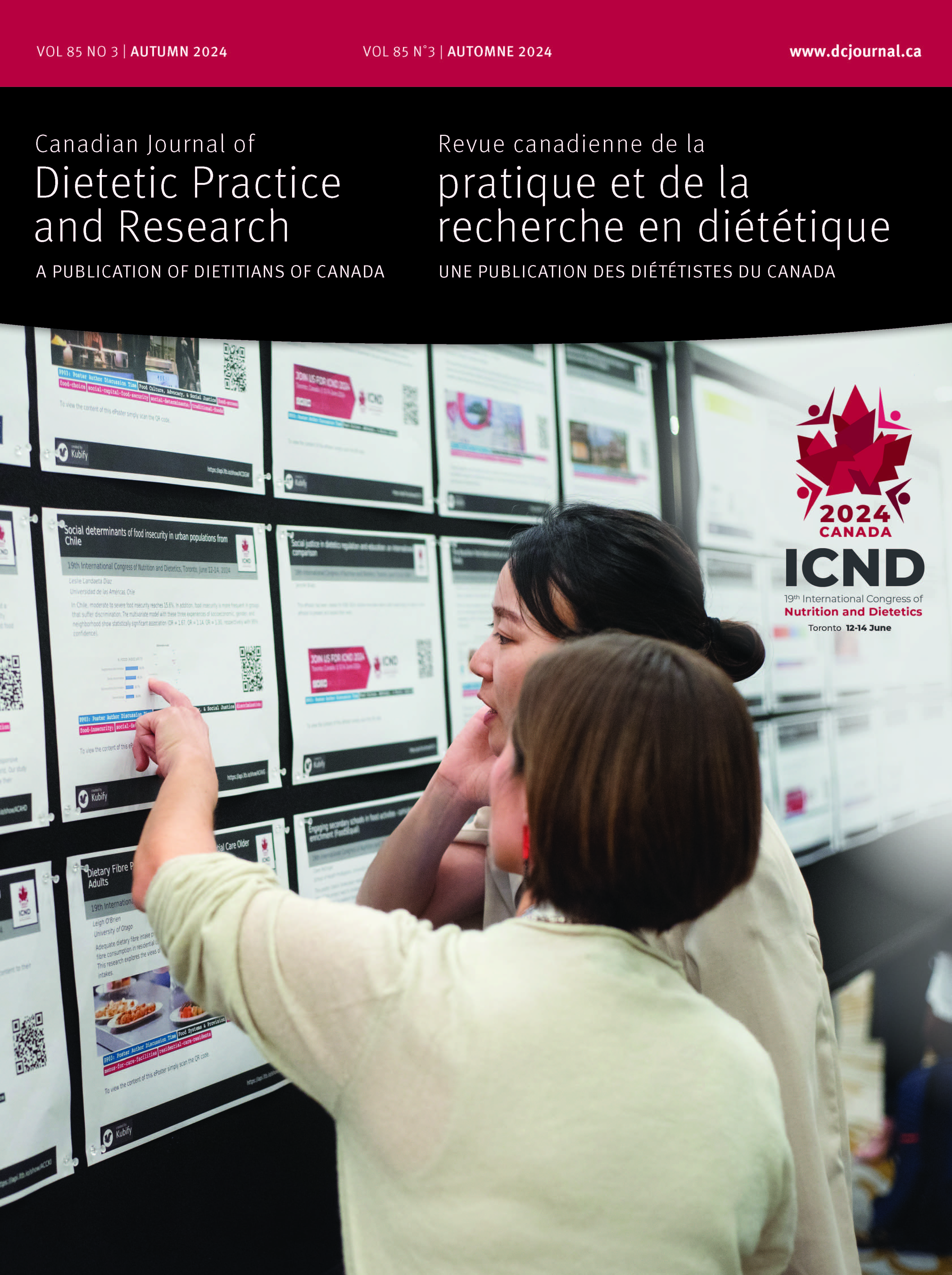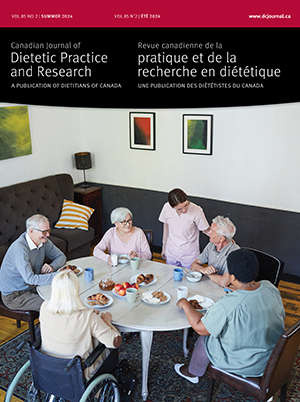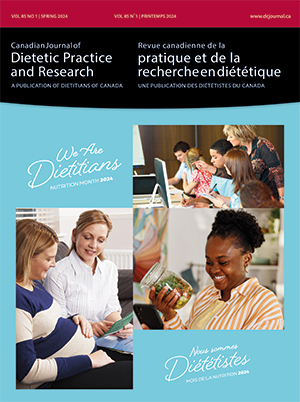Volume 84 • Number 4 • December 2023
Editor’s Message
Research
Purpose: To investigate the experiences of dietetic students in a faculty-supervised, noncourse-based service-learning (NSL) opportunity called Nutrition Ignition! (NI!) to understand how NSL activities contribute to dietetic education.Methods: This study used focus group methodology. A convenience sample was recruited from current members of NI!. Participants completed a brief demographic questionnaire and then engaged in a focus group discussion led by a trained moderator who followed a semi-structured guide. Six focus group discussions were transcribed, and a common theme template was developed by researchers.Results: Out of 46 eligible members of NI!, 33 agreed to participate. The main reasons participants joined NI! were to develop professional skills and to help children in the community. Participants discussed many outcomes from their participation in NI!, including enhanced communication skills, especially in terms of knowledge translation; increased ability to be flexible and adapt to “real-world” situations; deeper awareness of the research process; and expanded world view.Conclusion: This study suggests that NSL is an effective way to build dietetic students’ personal and professional skills and provide an additional opportunity in academic settings to prepare dietetic students for entry-level practice.
Purpose: Self-reported coronavirus 2019 (COVID-19) pandemic effects on dietetic job search, employment, and practice of recent graduates were explored within a national workforce survey.Methods: Graduates (2015–2020) who were registered/licensed dietitians or eligible to write the Canadian Dietetic Registration Exam were recruited through dietetic programmes, Dietitians of Canada’s communication channels, and social media. The online survey, available in English and French from August through October 2020, included questions about pandemic experiences. Descriptive statistics and thematic analysis were applied to closed and open-ended responses, respectively.Results: Thirty-four percent of survey respondents (n = 524) indicated pandemic effects on job search and described delayed entry into dietetics, fewer job opportunities, and challenges including restricted work between sites. The pandemic affected employment for 44% of respondents; of these, 45% indicated working from home, 45% provided virtual counselling, 7% were redeployed within dietetics, 14% provided nondietetic COVID-19 support, and 6% were furloughed or laid off. Changed work hours, predominantly reduced, were identified by 29%. Changes in pay, identified by 12%, included loss (e.g., raises deferred) or gain (e.g., pandemic pay). Fear of infection and stress about careers and finances were expressed.Conclusion: The COVID-19 pandemic profoundly affected both acquiring positions and employment in 2020 for recent dietetic graduates.
Purpose: Co-operative (co-op) education facilitates development of workplace competencies but may have unintended consequences for financial stability and food security. This study examined the association between co-op program enrolment and food security status among a sample of undergraduate students. Financial insufficiency and strategies to cope with it were also characterized.Methods: Cross-sectional data were collected from 167 co-op and 89 non-co-op students at the University of Waterloo from January to March 2019. Logistic regression assessed associations between co-op program enrolment and food insecurity.Results: Twenty-four percent of co-op and 39.3% of non-co-op students lived in moderately or severely food insecure households. Adjusting for confounders, the odds of living in moderately or severely food insecure households were lower among co-op students (adjusted odds ratio: 0.51, 95% CI: 0.27–0.97), though no association was observed when marginal food insecurity was included within the food insecure category. One-quarter (26.3%) of co-op students and 38.2% of non-co-op students reported financial insufficiency, which they tried to cope with by asking parents or friends for assistance or initiating paid work.Conclusions: Co-op program enrolment was weakly associated with lower odds of living in moderately or severely food insecure households, and food insecurity prevalence was high overall. Efforts are needed to alleviate food insecurity among postsecondary students.
Perspectives in practice
The Coordinated Approach to Child Health (CATCH) programme is an accredited obesity prevention programme in the United States, teaching children about nutrition, physical activity, and screen time limits. This study aimed to evaluate the perceptions of undergraduate and graduate student leaders’ about their experience delivering the CATCH programme in elementary schools in Northern Illinois school districts during the 2019–2020 school year and its impact on their personal and professional skills and on programme participants. An email questionnaire was sent to eligible students. Grounded theory was used to analyze the students’ responses. Two researchers assigned codes to the data and identified themes. Twenty-one students responded (50% response rate). Six identified themes include “purpose of CATCH programme,” “school facilities and resources,” “university students experience with CATCH lessons and activities,” “benefits to university student,” “benefits to children and teachers,” and “identified weaknesses and suggested improvements to CATCH.” University students delivering the CATCH programme appreciated the opportunity to practice in a real-world setting, gained transferable professional skills, increased programme content knowledge, identified CATCH programme benefits/strengths, and planned to apply lessons learned to future practice.
OPEN ACCESS
Many Canadian universities have committed to becoming more accountable to Indigenous Peoples by confronting the systemic, historical, and ongoing colonialism and anti-Indigenous racism that shape their campuses. In this Perspective in Practice piece, we invite the field of dietetics to consider how colonialism has shaped dietetics research, teaching, and practice. We also consider how we might transform the field of dietetics in ways that accept settler responsibility for interrupting racism and colonial harm; support the resurgence of Indigenous food and health practices; and recognise the connections between struggles to ensure that Indigenous Peoples can access culturally appropriate food and health care, and struggles for Indigenous sovereignty and self-determination. We do this by reviewing the history of the dietetics field, examining critical responses to existing Indigenisation and decolonisation efforts, and reflecting on recent changes to required dietetics competencies. We argue that curricula in dietetics programmes must teach the history of the colonial food system and equip students to identify and interrupt the individual and institutional colonial dynamics that contribute to the ongoing dispossession of Indigenous Peoples’ lands and food sources and negatively impact Indigenous patients.
Review
OPEN ACCESS
This scoping review mapped literature available on Canadian dietetics, nutrition, and foods students’ and graduates’ interaction(s) with simulation-based education (SBE) during undergraduate and/or practicum. One certified Librarian led the preliminary search (Summer, 2021), while three Joanna Briggs Institute-trained reviewers conducted the comprehensive search via MEDLINE (OVID), CINAHL (EBSCO), Academic Search Premier (EBSCO), Embase (Elsevier), Scopus (Elsevier), and Google (February 2022). A data extraction tool designed specifically for the study objectives and research inclusion criteria was used. We recorded 354 results and included 7. Seven types of SBE were recorded: (i) comprehensive care plan (n = 2); (ii) nutritional diagnosis/assessment (n = 2); (iii) body composition assessment (n = 1); (iv) introducing patient to dysphagia care (n = 1); (v) nutrition counselling session (n = 1); (vi) nutrition-focused physical examination (n = 1); and (vii) professional communications via social media (n = 1). Results indicate that Canadian dietitian-led SBE includes the use of simulated patients, nutritional diagnosis/assessment, and the creation of comprehensive care plans, among others. Students have been assessed for performance of trained tasks through exams, self-awareness surveys, and interviews, and SBE activities have been evaluated for effectiveness through questionnaires and interviews with users/students. Canadian literature is limited, and more can be learned by exploring the global context within and outside the profession.
Report
Purpose: We conducted a pilot survey among young adults attending a suburban Canadian university to understand: (1) knowledge of the 2019 Canada’s Food Guide (CFG); (2) self-reported food choices and eating habits; (3) perceived influence of the CFG on food choices and eating habits; and (4) suggestions to improve engagement with CFG.Methods: Students were recruited, through posts on social media platforms, to complete an online questionnaire between 7 March and 6 April 2020.Results: One-hundred and twenty-one (70% women) students responded. One-third (33%) of women and 8% of men reported consuming the recommended proportion of vegetables and fruits (i.e., 40%–60% of the plate) at their most recent meal (P = 0.001). Men were more likely to report overconsuming protein foods than women (58% vs 32%, P = 0.005). The perceived influence of the CFG on food choices and eating habits was low, with a mean score 2.2 ± 1.4 out of 7, with 7 indicating “highly influential.” Over 92% of participants believed awareness of the CFG could be improved through social media platforms.Conclusions: Although half of the participants correctly answered all 8 questions that assessed knowledge of the CFG, there is an opportunity for dietitians and related health professionals to improve engagement with CFG.
Purpose: To examine the level of agreement between a patient-completed food frequency questionnaire (FFQ) and assessment of usual intake by a registered dietitian (RD) to score adherence to a Mediterranean diet (MedD) in patients with inflammatory bowel disease (IBD).Methods: Patients with IBD completed a short FFQ and were subsequently interviewed by an RD. A 12-item MedD score (MDS), adapted from the Mediterranean Diet Adherence Screener (MEDAS), was calculated from the FFQ and RD assessments. To determine agreement between individual items, Cohen’s kappa coefficients were calculated. Absolute agreement between assessment methods was quantified using a one-way random intra-class correlation coefficient for a single measure.Results: Forty-six patients with IBD participated. The mean FFQ-MDS was 4.59 (standard deviation [SD] = 1.65), and mean RD-MDS was 4.83 (SD = 1.53). Kappa coefficients for individual MEDAS items ranged from 0.41 to 0.78 (p < 0.01) between the FFQ- and RD-MDS. Most items demonstrated moderate to substantial agreement. The intra-class correlation coefficient for absolute agreement between the summed FFQ-MDS and RD-MDS was 0.71 (95% confidence interval: 0.52–0.83, p < 0.001), indicating moderate reliability.Conclusions: This patient-completed FFQ may be a promising tool in clinical practice and research and would benefit from additional evaluation to validate its use in patients with IBD.


